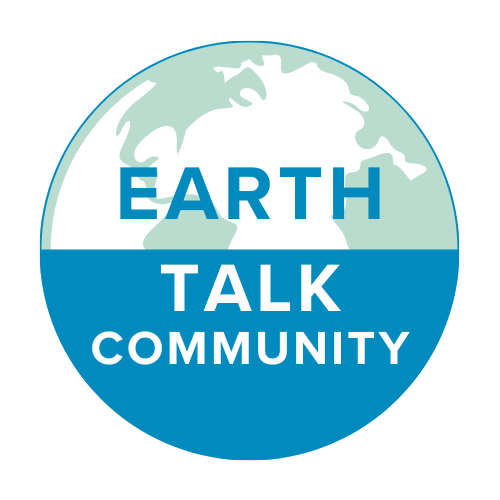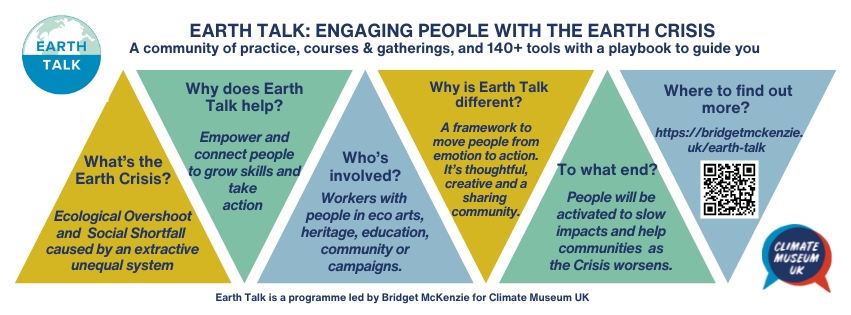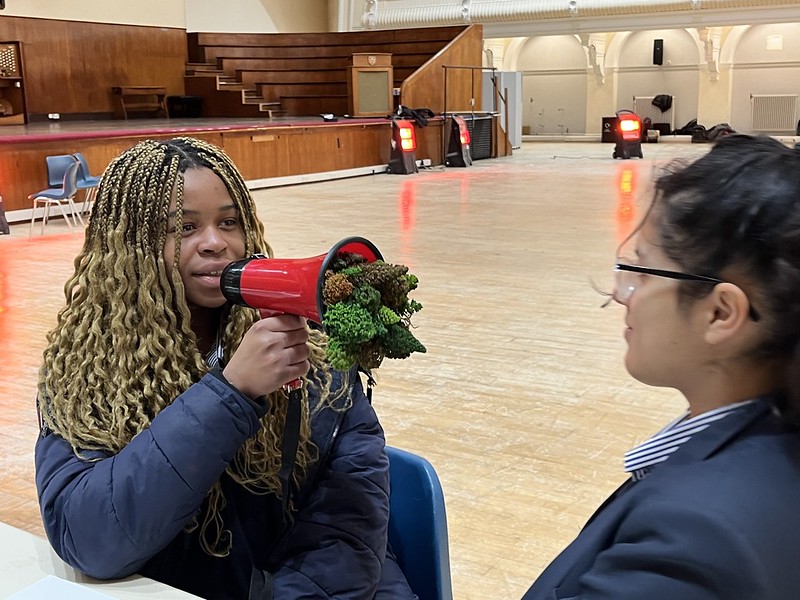
The Earth Talk community offers you a rich set of tools, courses and gatherings to help you hold creative conversations about the Earth Crisis.
Human activities have breached the safe limits of Earth’s operating system, and no country meets the needs of its people equally within these limits. This is a time of overwhelming Earth-sized issues, and it’s so tempting not to talk about them. Billionaires and harmful companies are funding disinformation that is changing how we’re governed, who we care for and what we believe. People need to express their feelings, need access to the science, need to understand what trouble is unfolding, need to imagine a thriving future, and be empowered to take action. But how do we do this?
The Earth Talk Community is a growing network of people interested in this question, and they’re trying out many different creative methods. They run imaginariums, school takeovers, research projects, climate cafes, assemblies, museum exhibitions, or art projects. Some of them are members of the Climate Museum UK collective.
I invite you to join for £75 to access these benefits:
- A network of like-minded others to share your practice and challenges, and find collaborators (using Hylo)
- A playbook in ten parts, which guides you to deliver…
- 140+ activities and delivery resources — including diagrams, posters, postcards, card sets, question sets, information sheets, workshop plans, mini-essays and slide decks.
- A programme of interviews forming the Earth Talk Community podcast.
- Courses of online workshops for training and discussion, repeated 2–3 times a year. You can also access recordings from the previous courses. (When advertised, courses will cost c.£125 for 4–6 workshops.)
- Additional welcome events, gifts, gatherings and enquiries organised by the community.
To learn more about why we need Earth Talk, watch this video.
Who is the Earth Talk Community for?
Most of the community (now 54 people, in Autumn 2025) are artists, museum or heritage workers, well-being workers, or wildlife & environmental workers.
There are no qualifications to join, or restrictions on where people come from. The main limitations are:
- the use of English language and
- meeting when convenient for the UK time zone.
How do I join?
Sign up using this short form https://forms.gle/tzg9vb8Jaebo6A3W9
Fill it in, pay £75 to join, and send an email to get access to the joining links.
A few more practical points
Are the courses certified? There are no penalties for missing sessions and no certificates. This may change if the Community moves for more formal accreditation.
When will the next course be? The first runs of the course were in Autumn 2024, Spring 2025 and Summer 2025. The course is currently being reshaped to be more creative and practical, so the timing of the fourth course is to be confirmed. (If you haven’t already paid an upgrade fee, it will be £125 to take part in courses, when advertised, and if you want to take part.)
How are the courses structured? Past courses consisted of 6 or 7 online workshops, each 2 hours long. They included a mix of presentations, creative tasks and discussion. The workshops were mostly recorded, only for the community to access. The format is being reshaped with community feedback.
What is the Earth Talk community podcast? This is in development. It will consist of interviews with inspiring practitioners engaging people in creative ways with Earth Crisis issues. Some interviews will be live – with an audience of the Earth Talk community, enabling wider discussion. The podcast will be available on 10 channels.
Do I have to renew my membership? No. It is a one-off cost. You can leave the group voluntarily, but you won’t be ejected. You can pay an extra £125 to take part in courses.
How are access and safeguarding needs met? For safeguarding reasons, the course is suited to adults (aged 18 and above). The online sessions take place in Google Meet and transcriptions are provided. In the book, the diagrams are text-described. If you would like to ask any questions or share access needs, please get in touch.
What is Hylo? Hylo is a prosocial community platform for purpose-driven groups. It is free, open-source, and not-for-profit. All the other groups on Hylo are dedicated to regenerative values, and it is stewarded by the Terran Collective dedicated to a regenerative future. Earth Talk is a group I’ve set up for this course. After paying your chosen fee, I will send you an invitation link. You will need to set up your profile, and then you can also join other open groups and create your own.

More about the Earth Talk playbook
It is an illustrated book written for the Earth Talk course and is not otherwise published or printed. The ten parts are:
- PART ONE: WHAT, WHO AND WHY? Sets out where these ideas come from, the book contents in detail, and why Earth Talk is so important.
- PART TWO: DEEP DIVE INTO THE EARTH CRISIS Introduces the basics of the Earth Crisis to prepare you to engage people with its wider systemic factors.
- PART THREE: GLOSSARY FOR THE EARTH CRISIS Offers mini-essays and diagrams to explain 45 key concepts, in alphabetical order.
- PART FOUR: DESIGNING GOOD EXPERIENCES Explores some principles of designing conversations and experiences. It helps you prepare, to raise your game and reflect on your practice. It introduces the Narrative Framework for the Earth Crisis.
- PART FIVE: SENSING AND FRAMING Offers activity templates for people to express their feelings and ways of framing the Earth crisis and its issues.
- PART SIX: SENSE-MAKING Offers activities to explore the causes, systems and histories of the Earth crisis in more depth.
- PART SEVEN: MEANING-MAKING Offers activities to dig deeper into impacts on lives and what matters.
- PART EIGHT: IMAGINING AND DECIDING Offers activities for imagining the future and creatively exploring potential tactics for change.
- PART NINE: ACTIVATING Offers activities for getting people activated — relevant to their places, their needs and interests.
- PART TEN: RESOURCES AND INSPIRATIONS Signposts some reading material and additional resources.
More about my training
My motivation to share all this at very low cost is to rapidly spread the skills to activate the people we connect with in our work or daily lives, to help them understand the Earth Crisis, to tackle its causes, and to care for others as its impact worsens.
I have developed or adapted these activities mainly through Climate Museum UK. I founded CMUK in 2019 to focus my practice on engaging people creatively with the Earth Crisis, and to create opportunities for fellow practitioners to develop their engagement skills. I also co-founded Culture Declares Emergency, a movement of individuals and organisations in arts, design and heritage declaring a climate and ecological emergency. My background is working in cultural learning, for example, as Education manager at Tate, as Head of Learning at the British Library, and as director of Flow Associates since 2006. See an overview of my work here https://bridgetmckenzie.uk
I have been delivering training to teachers, artists and museum staff for 32 years. In the past 10 years, most of this training has focused on how to engage the public and young people with critical issues such as environmental injustice.
“We need 1000 Bridget’s doing this work.” Jonathan, Aviva
“Our enormous thanks for your inspiring, motivating and energising presentation last night. It truly felt like a timely ‘call to arms’. The discussion that followed and potential future activity catalysed by your presentation feels very rich and urgent, so a big thank you again…Placing love and emotion at the heart of climate activism feels like the only truly sustainable way forward.” Sara Dudman, Somerset Art Works
“That was fabulous! You are indeed doing what you say…talking about the problem and engaging with both public and peers. I am inspired.” Alison Smith, following workshop at MuseumNext
“Many thanks for your excellent workshop on Friday — you really managed to get everyone talking and thinking about what might be achievable and I hope that we’ll have a good starting point from which things may be taken forward.” Yvette Shepherd, Museum Development Officer for Organisational Health, after a workshop on ‘What can museums & archives do about climate change?’
“The most impressive content from Theme days that ended yesterday was Bridget McKenzie’s keynote speech.”; “It got me thinking about sustainable development in my own work, how we could improve this in everyday work in community section”; “Your performance was the most believable and relatable of them all.” About a keynote at Museum Theme Days in Helsinki
Here’s my mailing list for occasional emails of latest news and articles. Sign up here https://bridget-mckenzie.kit.com/

